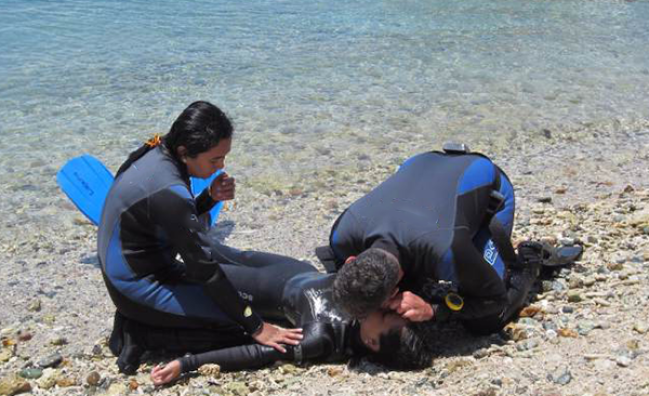Overview
PADI Emergency First Response – EFR in Dahab.
The Emergency First Response qualification is fantastic for divers and non-divers alike, and it’s intended to give you the confidence to deal with and respond to medical emergencies, not only in the diving world, but also in everyday life.
Our Emergency First Response training is geared to build on confidence, adressing divers with the ambition to promote to the event of medical urgencies or emergencies.
As a participant you will become familiar with emergency care. We teach you how to cope with incidents in a nonstressful learning environment. You will find that these courses come by with self-study manuals, videos and quick reference cards. It will enable you start learning right away.
Emergency First Response training focuses on building confidence in lay rescuers and increasing their willingness to respond when faced with a medical emergency.
The Emenrgency First Response courses meet the CPR and first aid training requirements for the PADI Rescue Diver course and all professional-level ratings.
PADI Emergency First Response. This is how you qualify.
You must be at least 18 years old and must have had Emergency First Response Primary and Secondary (CPR and First Aid) training within the past 24 months.
PADI Emergency First Response. This is what you will learn.
- Primary Care (CPR) – This course teaches you the steps and techniques for handling life-threatening emergencies. You’ll practice eight skills for aiding patients who aren’t breathing, have no heartbeat, may have a spinal injury, may be in shock or who may have serious bleeding. You’ll learn to how to perform CPR and continue to monitor the patient, so that you provide every possible chance of survival while waiting for emergency medical services to arrive.
- Secondary Care (First Aid) – Many medical conditions are not life-threatening and emergency medical services are sometimes delayed or unavailable. This course teaches you how to provide first aid that eases pain and reduces the risk of further harm. You’ll learn to assess a variety of injuries and illnesses and practice bandaging and splinting.
- Care for Children – Allows participants to learn, practice and apply emergency care skills specific to helping infants and children with medical emergencies. It’s designed for those who work with children or are likely to have to respond to emergencies involving youngsters. This course is often integrated with Primary Care (CPR) and Secondary Care (First Aid) courses.
- CPR & AED – Focus is on CPR training and teaching participants how to use an AED (automated external defibrillator). When workplace or governmental requirements specify this training, the CPR & AED course meets the need. This course is often integrated into First Aid at Work programs.
- First Aid at Work – In some parts of the world, governmental regulations call for enhanced CPR and first aid training for the workplace. First Aid at Work programs designed for these areas include additional topics and skills to meet requirements while following the easy to learn EFR approach to training.
- EFR Refresher – Refresh your CPR and first aid skills every 24 months. That is what the EFR Refresher course is designed to do. Focusing on key skills, the course allows you to stay up-to-date and ready to lend aid when needed.
Book your Dahab diving adventure with Advenius divers.
You can get started by press book now and specify when would you like to start your course with Advenius Divers. Once you do that your instructor from Advenius Divers would provide you with the learning materials to get started gaining the necessary knowledge.

Leave a review